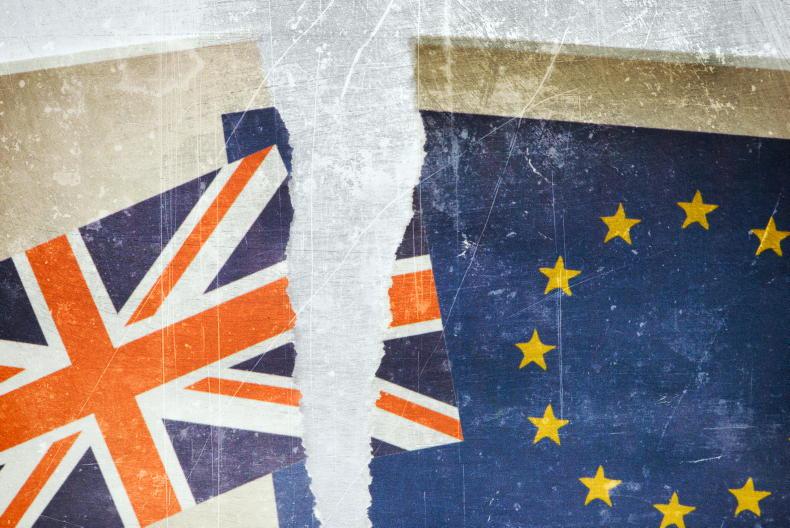The EU-UK trade deal maintains Ireland’s agricultural export market in Britain. A no-deal outcome would have destroyed it.
That said, the fact that the agreement had to be rushed through at the last minute left little time to debate who lost the least in the negotiation. For it is in the nature of a divorce, like Brexit, that both sides actually lose.
First let us look at the British side.
For them, the goal was “sovereignty”. In sum, Boris Johnson gained more UK sovereignty over the island of Britain, but did so by sacrificing a considerable measure of UK sovereignty over Northern Ireland.
EU rules, in which neither the UK nor the people of Northern Ireland will have a direct say, will continue to be made for, and apply in, Northern Ireland
Traditionally, sovereignty in Britain was seen as the unfettered power of the British parliament to legislate. Brexiteers have interpreted it as taking back control into the hands of British ministers, rather than into the hands of parliament as such.
On the other hand, EU rules, in which neither the UK nor the people of Northern Ireland will have a direct say, will continue to be made for, and apply in, Northern Ireland. This creates a democracy deficit, even if the subject matter will be highly technical.
After much effort and controversy, the UK has won the right to diverge from EU rules for the island of Britain. To show that the effort was worthwhile, it will be tempted to adopt different rules on trade and regulatory matters just for the sake of it.
The implications for NI unionists could be quite destabilising
But the more British rules diverge from EU rules, the more will Northern Ireland diverge from the rest of the United Kingdom.
This creates a political minefield and a strategic dilemma.
The implications for NI unionists could be quite destabilising. A sense of losing control over their future, and of not being represented when decisions are being made, could encourage irrational politics. This will require serious reflection in Brussels, London and especially Dublin, before there is any new divergence between the UK and the EU.
Consequences
The Joint EU-UK Committee, already set up under the Withdrawal Agreement, will need to monitor the political and security consequences.
Title X of the agreement requires advance notice, and consultations, on any changes in regulations between the UK and the EU. It will be important for the peace and security of these islands that these consultations include representatives of all major interests in Northern Ireland.
On the other hand, the agreement contains significant gains for the UK side from a “sovereignty” perspective, at least as far as the island of Britain is concerned.
Firstly, there will be no direct application of decisions of the European Court of Justice on the island of Britain.

Secondly, while the UK has accepted that it will not regress from present high social and environmental standards, it will be free to set for itself the detail of those standards. These may be different from those in the EU and thus in Northern Ireland. This right to diverge is what UK Brexiteers saw as an expression of the UK’s sovereignty.
But the UK also accepts that divergence will not come for free.
It has had to accept that services exports from the UK have lost automatic access to the EU market, a large and incalculable sacrifice. It has also lost the European Arrest Warrant and access to EU databases.
As one advocate of Brexit, Dr Liam Fox MP, put it in Westminster last week: “If we want to access the single market, there has to be a price to be paid. If we want to diverge from the rules of the single market, there has to be a price to be paid.”
A great deal will depend on how much use the UK will make of its new freedoms
The agreement establishes detailed mechanisms to settle what price will have to be paid for any new divergence.
These new mechanisms, a partnership council, joint committees, and arbitration tribunals, are completely untested at this stage.
A great deal will depend on how much use the UK will make of its new freedoms. The more EU and British policies diverge, the greater will be the strain on the agreement.
In the last five years of debate about Brexit, UK politicians have actually advanced very few ideas of how they might use the new freedom conferred by Brexit.
So it is impossible to assess, at this stage, whether or not they might do things that would push the EU to seek redress through the mechanisms of the agreement, or contribute to instability in Northern Ireland.
If the arbitrators find that either the EU or the UK has breached the agreed principles, the other party will be allowed to impose tariffs or prohibitions to compensate for losses
If problems arise and these cannot be settled in the committee system, there is an agreed provision for arbitration – three-person arbitration tribunals which will operate on strict time limits. If the arbitrators find that either the EU or the UK has breached the agreed principles, the other party will be allowed to impose tariffs or prohibitions to compensate for losses it has suffered.
Valuable
This dispute settlement aspect of the agreement is valuable from an EU point of view.
Without it, any disputes would have had to be referred to the WTO. The WTO system is both cumbersome and narrow. Parties can stall, adopt delaying tactics, or ignore WTO rulings.
Disputes in the WTO can drag on for years, as we have seen with the US-EU dispute about subsidies to Boeing and Airbus.
In global terms, the continent of Europe as a whole has been weakened by Brexit
That said, we will now be replacing a single set of rules, interpreted by the European Court of Justice (ECJ), with individual arbitration tribunals operating under tight deadlines.
This could lead to inconsistent decisions in different areas of trade. If a tribunal interprets EU law differently to the interpretation later made by the ECJ, there could be real difficulties.
The UK will also be free to negotiate trade agreements of its own with non-EU countries. These negotiations may create additional pressure for even more divergence between UK and EU standards, than the UK authorities themselves might have chosen.
Pressure
It may come under pressure to allow the imports to the UK that would not meet EU standards such as chlorinated chicken, hormone-treated beef, or genetically modified foods. If these products are then incorporated into exports to the EU, the EU will have to ban them.
UK or EU policy decisions could also skew the level playing field on which EU and British producers must compete.
In title XI of part one, and in part six of the agreement, there are provisions for resolving disputes.
If the dispute is about unfair subsidies, firms can go directly to the courts, citing the text of title XI.
There could eventually be recourse to an arbitration tribunal
If the dispute is about something else, the remedy will be under part six and will be indirect, requiring either the EU or UK side to take the matter up in one of the many committees set up under the agreement. There could eventually be recourse to an arbitration tribunal.
In global terms, the continent of Europe as a whole has been weakened by Brexit. The day to day effect remains to be seen.









SHARING OPTIONS